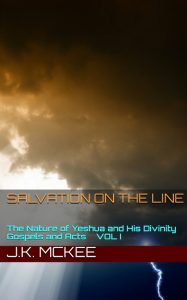
©Ig0rZh via Istockphoto

In the past, the big issue which has faced the Messianic movement has understandably been the Messiahship of Yeshua of Nazareth, widely connected to the purposes of Jewish evangelism. For the present, the big issue which is staring right at the broad Messianic movement—to which no congregation, fellowship, family, or individual is entirely immune—is how to approach the nature of Yeshua (Jesus). Is Yeshua the Messiah God, or is He a created being? While many affirm Yeshua of Nazareth to be the eternal, uncreated Son of God who is indeed God—there are many others who express various levels of doubt about this, and then others who think that Yeshua is a created being and not God. There are those who will affirm that Yeshua is a supernatural being to be sure—perhaps even the first created being in the cosmic order, pre-existent of our known universe—but nevertheless created and not God.
This publication, Salvation on the Line: The Nature of Yeshua and His Divinity, affirms a high Christology. Not only does it affirm a high Christology of Yeshua being God, it very much defends the view that while understanding all of the intricacies of Yeshua being God is not required for salvation, recognizing Yeshua as the Lord (YHWH/YHVH) of the Tanach Scriptures (Old Testament) most certainly is required for salvation (Romans 10:9, 13; cf. Joel 2:32).
This resource has consulted and engaged with a wide array of resources and perspectives across the Messianic movement, into the more independent sectors of the Hebrew/Hebraic Roots movement, the views expressed by various Christians labeling themselves “Biblical Unitarians,” and even those few theologians of note who hold to a low Christology. This involves an array of articles, books, commentaries, and even a few Bible versions. Most important, would be some of the excellent, thorough, and readable resources defending a high Christology, seen within the realm of broadly evangelical Christian theology.
The considerable bulk of Salvation on the Line, while defending a high Christology, is necessarily spent going to the text of the Holy Scriptures (Genesis-Revelation). This is not only because the Holy Scriptures are to be decisively regarded by God’s people to be the Word of Life, but also because this is the venue where the rise and fall of theological concepts are to be found. None of us wants to be found holding to a view of Yeshua being God simply because of some kind of fundamentalist dogma—where if we hold to a different view our name will somehow end up on a list or in a white paper as being stigmatized as some kind of “cultists.” We want to be found holding to a view of Yeshua being God, precisely because that is where the witness of Scripture directs us, it is the genuine testimony of the Messiah and His early followers, and because it is required for our redemption from sins as fallen human beings. The author firmly believes that such a principled case can be made in going to the text of Scripture, and that those who hold to a low Christology are decisively lacking in many areas.
550 pages
